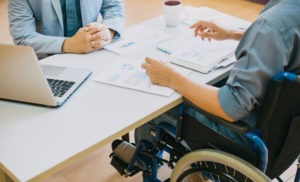
When a loved one has been severely injured in an accident, particularly if the accident involves head trauma, they may be incapable of advocating for their own rights. GA Code § 29-5-22 (2016) has made provision for such situations in the form of guardianships and conservatorships.
The appropriately appointed representative for the disabled individual can use their position as conservator or guardian to make decisions concerning the patient’s financial, physical, and mental well-being. This representative can meet with a lawyer to pursue compensation.
Conservatorship, Guardianship, and Power of Attorney
If your loved one is incapable of making their own decisions due to an injury-induced disability, you can file a petition with the probate court in the county where the disabled individual resides. You use the petition to seek guardianship or conservatorship, depending on the needs of your loved one, the ward.
As the petitioner, you are required to provide evidence that your appointment is in the best interest of your loved one. The court can grant a conservator certain powers consistent with the needs of the ward. A conservator, for instance, may have permission to help the ward with financial or legal matters but not to make decisions regarding medical treatment. A guardian, on the other hand, has more control over the ward, including personal decisions about where the ward lives, what they eat, or what medical treatment they receive.
When you petition to become a guardian or conservator, you must prove that:
- The disabled person is incapable of completing certain necessary tasks.
- You are requesting the least intrusive method of assistance based on a medical doctor’s assessment.
- You do not have a conflict of interest.
- You will respect the patient’s rights and dignity.
- Your appointment is consistent with the desires of the disabled loved one if they are able to provide consent.
Power of Attorney
In some cases, the disabled individual can complete a power of attorney document, which allows their loved one to take on certain responsibilities. The person granted power of attorney has the authority to handle specific tasks as indicated in the document. Power of attorney is often used to allow family members to manage finances and property on behalf of the disabled person.
There is a wide range of possibilities when it comes to protecting your disabled loved one’s right to fair compensation for their losses. An attorney handling disability and injury cases can help you examine the possibilities and determine the best way to move forward.
For a free legal consultation, call (404) 888-8888
Personal Injury FAQs
Can I Pursue Punitive Damages in My Atlanta Personal Injury Case?What Types of Personal Injury Cases Are Common in Atlanta?How is Liability Determined in Atlanta Personal Injury Cases?How Can I Protect My Rights When Dealing with Insurance Adjusters in Atlanta?When Should I Hire a Decatur Personal Injury Lawyer?What’s the Statute of Limitations for Personal Injury Claims in Decatur?Do I Need a Lawyer to File for Conservatorship?
While you do not legally need an attorney to file your petition for guardianship or conservatorship, the requirements can differ by county. Some judges will not allow individuals to file a petition without an attorney. Even if you can file without a lawyer, you will need to compile and present compelling evidence to support your petition.
A personal injury and disability attorney has a thorough understanding of applicable laws and knows how to use evidence to establish your claim. They help you obtain power of attorney or conservatorship and file an injury claim on behalf of your loved one.
Rather than trying to navigate the complexities of Georgia law alone, you can hire a lawyer. That way, you can focus on helping your loved one recover and making the necessary lifestyle adjustments to ensure their comfort and well-being.
Statute of Limitations on Personal Injury Claims
Even if the injured party’s disability is temporary, time is of the essence in a personal injury lawsuit. O.C.G.A. § 9-3-33 strictly limits the amount of time that you have to file a lawsuit. If your disabled loved one is eligible to pursue an injury claim but incapable of doing so, you may need conservatorship or power of attorney to ensure that the claim is filed in a timely fashion.
Missing the deadline for filing such a claim could mean that the disabled person’s estate or their family members will be responsible for the costs associated with the injury.
Contact Bader Scott Injury Lawyers to Discuss Your Situation
Our attorneys handling personal injury and disability cases can help you navigate the complexities of disability laws and conservatorship. In addition, they will help you establish a case against the parties who were responsible for the injury and associated losses.
At Bader Scott Injury Lawyers, we understand that every case is unique. We are committed to providing legal representation to our clients with disabilities and their loved ones. Let us help you and your family.
Call or text (404) 888-8888 or complete a Free Case Evaluation form


